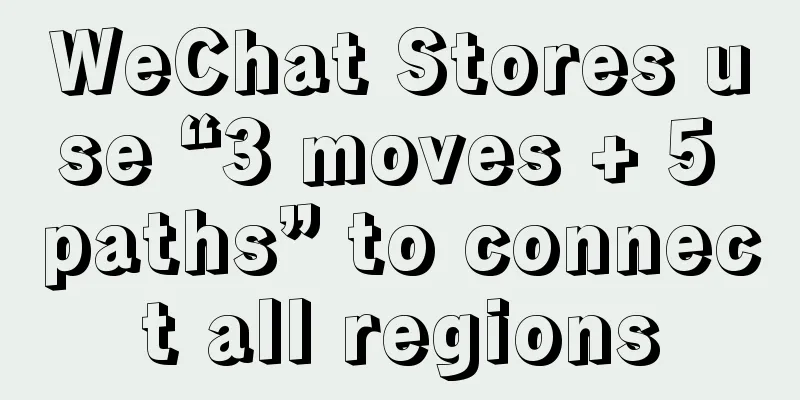Giant platforms are competing fiercely in local life, how should merchants choose?

Offline life service business has been considered as "dirty and tiring work" in the past decade. It is at the nerve endings of the economy, extremely sensitive to environmental changes, and most closely related to people. Various magical forces have attempted to occupy this huge rigid demand market, but whether in the form of O2O or in the form of high-valuation new consumption, large platforms and large capital have all returned empty-handed in rounds of battles. Now, a new round of local life battle is about to begin. Douyin's local life business has been advancing by leaps and bounds; Meituan is trying to increase short videos and live broadcast content; WeChat is also testing "store delivery" in Guangzhou and Shenzhen; Alipay has configured a live broadcast function for merchants; Ele.me's in-store business (word of mouth) has merged with AutoNavi to build a complete route of navigation-in-store-dining... This time, everyone has lowered their posture in an especially unanimous manner. They are no longer disruptors, but service providers - standing from the perspective of merchants to overcome difficulties together. The original intention of the platform is good, but for merchants, there are so many entrances that it becomes difficult to choose. Will the cost that merchants need to bear at the same time become higher and higher when investing in and operating multiple platforms? In order to keep up with and cooperate with the layout of the platform, will the online marketing and operations of merchants become more and more demanding? Many platforms require investment from scratch. Is it necessary for merchants to do it all over again, and how much new additions can they bring in? With so many platforms, gameplays, and products, do local merchants have a set of basic logic and methodology available? Small and medium-sized merchants have limited human, financial, and material resources. Everyone can't help but worry about whether they can do it well, and whether they will lose sight of the big picture and miss opportunities? Combining the platform's series of product ideas and growth methods, we will take a detailed look at the three dimensions of attracting new customers, position management, and conversion and repurchase to see which directions offline life service merchants can simplify and leverage. 1. Attract new customers: both on demand and as a wholeFor merchants who only do offline business, their business is likely to be limited to a few kilometers nearby; merchants who try to integrate online and offline business also have to face the environment of stock competition. Therefore, finding new volume has become a topic that cannot be avoided. Life service platforms such as Meituan and Ele.me have strong "innate" tool attributes. The consumption process of consumers here is to first clarify what they want, then find out which merchants nearby can meet their needs, and finally make the final choice based on cost performance. Therefore, merchants on life service platforms are more likely to attract new customers by targeting those who have relatively obvious demand. This also means that the key points for merchants to find incremental growth are: first, to be seen earlier and meet demand faster; second, to be more eye-catching among similar products and easier to be selected. Corresponding to these two key points, advertisers on life service platforms mainly rely on search bidding and brand exposure. The former is used to improve the ranking of merchants so that users can see them earlier in the list; the latter is to make merchants appear more frequently in more scenarios within the site. Taking Meituan as an example, its current advertising products include three: First of all, the main purpose of "Promotion Pass" is to allow merchants' stores to appear in prime positions in search lists, category filtering pages, and channel display pages, so as to improve rankings and increase customer flow into the store. Secondly, "Smart Booth" is exposure advertising, such as opening screen, homepage information flow, guess you like and note content marketing, etc. There is also "Brand Show", which is actually the "Search Product Special" also available on other platforms. After users accurately search for brand words, the merchant's store will appear in the first place, and brand information such as pictures or videos will be presented. Meituan’s three types of advertising products Seizing traffic with relatively obvious demand is the "basic version" of attracting new users. When the platform traffic growth gradually reaches the ceiling, the efficiency of various gameplays will be limited. At this time, if you want to attract new users in a wider range for a specific stage, you may want to look at platforms with content genes such as Douyin, Kuaishou, and Xiaohongshu. Doing business is a long-term thing, and there are many "specific stages" in this long process. For example, there are many moments when more people need to "establish awareness", including when a new store just opens and influence needs to be quickly increased; when new products are launched, consumers need to know and plant seeds faster; and during promotional periods and big sales, consumers also need to know that the business has prepared many preferential activities. Another type of "specific stage" is when businesses urgently need to "open up new sources of income", such as department stores that originally did offline business, but offline traffic is limited and difficult to grow, and there may even be a decline in traffic, so it is necessary to attract traffic from a wider range. For big brands, huge traffic plus rich content can make "event marketing" more efficient. Merchants can use various platform resources to create "big events" when new products are launched or at big promotions, quickly concentrate natural traffic, and make the event "go viral". For example, last year, Li Shang Huang set up topics in Douyin's Heart-beating New Product Day event, and also covered important festivals and big promotions throughout the year, integrating thousands of influencers to promote the new product, and the new product quickly became a hit. Contents of the Emperor's Grain For new businesses, using a large number of influencers for content marketing can help them get through the cold start period faster and transform from a "new store" to an "Internet celebrity store." For example, restaurants can find influencers to do food tasting and evaluation to truly show the in-store dining environment and dishes; businesses with unique features in terms of products or store design can use influencers to magnify their uniqueness, or let store owners appear on camera to directly express their ideas and attitudes, winning the emotional recognition of users. In addition, for department stores, which originally only did offline business but have a large overall business scale, they can directly operate online stores and distribute coupons and promotions through live broadcasts. On the one hand, this allows employees and shopping guides to face users directly online and give full play to their professional advantages; on the other hand, it can also be combined with offline activities to enhance the overall activity of the mall. Since Douyin already has mature short videos, live broadcasts, and topic activities, merchants who want to increase their sales as much as possible are more suitable for "multi-pronged approach", overlapping and coordinating. Xiaohongshu, which uses pictures and texts to "plant grass", has its own unique ideas for attracting new customers. Taking advantage of the massive number of local evaluation KOCs and amateur bloggers gathered on Xiaohongshu is a "cost-effective" way for local life merchants to promote products. Because the number of fans of KOCs who do local evaluations is not very high, their asking price is relatively low; plus, the notes that are mainly in the form of pictures and texts are easier to produce than videos, and many merchants can even make their own materials and find KOCs to distribute them. In addition, local store exploration KOCs usually have "expert mutual recommendation groups", and as long as the merchant's products are good enough, experts will actively seek cooperation, which can also save merchants a lot of effort. However, in order to lower the cost, merchants have to exercise more "subjective initiative". For example, there is a high probability that there will be problems with the process of cooperating with KOCs, so merchants must have strong control and follow up the entire process. And if there is not much budget for influencer investment, merchants have to operate their own accounts and create content, which is even more difficult. For example, a small and beautiful coffee shop needs to highlight its own unique style, so it is difficult to find a direct reference example. Restaurants must first find ways to warm up and attract the first batch of consumers. For example, Cao's Duck Neck, a local Sichuan stewed food brand, has recently opened many new stores in Beijing. The owner has been creating a group to make advance notice before the opening, and he also called fans in the group to do tasting activities when it just opened. Cao's Duck Neck Xiaohongshu Operation It is also important to emphasize that attracting new customers and traffic is actually done “on demand” and does not need to be done all the time. For small shops, after attracting new customers on a large scale, they may not be able to handle the huge traffic offline. For shops that need to maintain old customers, the influx of too many new consumers may also affect the consumption experience of old customers and even disrupt the original business rhythm of the merchants. In fact, local life is originally more of a business that needs to complete conversions offline. It is necessary for merchants to consider issues such as whether the online and offline connections are smooth and whether the offline operational capabilities are sufficient, and to look at the single link of attracting new customers from a more "holistic" perspective. 2. Position management: clarify goals, enhance cognition, and cooperate wellWhen all players hold the goal of "finding growth", "position management" is likely to be an easily overlooked link. From the perspective of consumers, we have seen many such cases: many merchants only have a simple store profile on the life service platform, no store photos, no food introduction, only a very small coupon, and no feedback for medium or bad reviews. It can be seen that on platforms such as Meituan and Ele.me, which are already very stable and users have a more mature mentality in finding stores, position management actually involves a lot of details. The most basic thing is to operate and manage online stores, including whether the store positioning is accurate, whether the menu has been updated with the store, and how attractive the packages and vouchers are, etc. There is also the issue of word of mouth. Although consumers no longer fully trust ratings and good reviews, they often use bad reviews to check the true situation of a store. The large number of reviews accumulated on the platform for a long time will play an important role when users make consumption decisions. In addition to doing a good job in basic store operations and maintenance, because the platform is still "innovating", it is also necessary for merchants to seize opportunities in advance to seek more possible growth. For example, you can see that the "Guess You Like" recommendation section on Meituan's homepage contains a lot of user reviews and recommendations, as well as experience records of participating in free meal activities. This means that merchants on the local life service platform are not limited to search bidding and exposure advertising, but also have a lot of "content" that can be utilized. Recommended on Dianping.com and Meituan.com homepage And now the platform is still trying to add more content. For example, Ele.me held a brand day event on the second floor, where brands can place TVC and other content and special marketing activities, which is equivalent to adding an exclusive brand display window. Meituan launched live broadcasts on the Dianping homepage and Meituan APP as early as 2020; last year Meituan also tried to increase short video content and added a "second floor" to the takeaway module to carry it. Meituan also mentioned in its 2022 mid-year financial report that it has cooperated with well-known brands to launch special marketing activities, which has further increased merchant penetration and depth of cooperation. In addition, local life platforms now have the idea of "ecological integration". For example, behind Ele.me is the Alibaba ecosystem. Merchants can operate on Ele.me and link up with other Alibaba platforms to use more marketing resources. Previously, Pizza Hut cooperated with Youku's drama "Xiao Min's Family" to do product placement and inserts in the drama, and at the same time held exclusive activities on Ele.me to promote joint packages. Under this new idea, the "position" is not just a role of taking over, but can take into account and amplify brand appeal and business appeal. In the case of Meituan and Ele.me, the actual operation is to be more sophisticated and innovative on top of the basic operations. How to operate a position on Douyin may still be a new topic for many businesses. In fact, Douyin has already completed the products, tools and mechanisms related to local life service business. In the "Nearby Food, Drink and Fun" section at the top of the local page, users can enter different categories such as food, leisure and entertainment to find merchants and place orders for group purchase packages. At the same time, users can also search directly, and the group purchase projects of nearby merchants will appear at the top of the short video content. The second thing that cannot be ignored is self-broadcasting. Information flow ads can be directly pushed by the platform. Users only need to order packages or group purchase coupons through the group purchase link. However, since users are "passive" consumers, it is easy to have the problem of planting grass on a whim but not pulling it out in the end. Live broadcasting is equivalent to adding another incentive to pull out grass. The anchor will repeatedly remind and guide how to use the group purchase coupons, and more takeaway merchants will directly place orders and deliver them during the live broadcast. The entire link of planting grass and pulling out grass is more complete, and it can also gradually cultivate users' consumption habits. What is special is that Amap has now become an incremental entry point for local businesses. In the "Nearby" interface of Amap, multiple channels such as food, hotels, leisure and entertainment are pinned to the top, and the functions are no different from other platforms. After merchants settle in Amap, they also launch special group purchase packages or coupons online, just like other platforms. Users can browse and search in the nearby page, or directly search for stores and enter the merchant's homepage to place an order. Amap's "Nearby" interface and business homepage When multiple platforms can serve as positions, merchants can hardly achieve "full coverage" on their own. In addition, as major platforms "invade" each other's businesses, adding various functions and enriching content, it is also very difficult for merchants to operate on their own. Therefore, more small and medium-sized merchants will directly hand over the operation tasks to service providers. How to do it specifically, whether it is good or not, actually tests the ability of the service provider. However, for businesses, it is not easy to choose a reliable service provider because it is difficult to clearly identify the service provider's ability level when they first start cooperating. Many small and medium-sized service providers only help merchants with registration, operation, maintenance and other work, which are very basic and cannot bring any incremental growth; some service providers with Internet thinking will try to make local merchants more "digital", but this process may also consume too much manpower and financial resources. In addition, many service providers only do business on a certain platform. If brands want to deploy multiple channels, the operation will be more complicated in this "one-to-many" state. Even more troublesome is the chaos in the industry: for example, service providers want to circumvent commission sharing and find platform loopholes to operate, but this leads to merchants being punished; contacting experts to explore stores, but unable to make specific standards and requirements for their delivery behavior, resulting in delays in promotion plans, etc. At present, it is actually quite difficult to operate well. Merchants need to have clearer needs and goals, and have a better understanding of service providers and platforms; platforms need to give full play to their own advantages, actively guide and motivate service providers, help merchants continue to grow, and gradually improve their ability to cooperate with service providers and platforms. 3. Conversion and repurchase: focus on private domainIt is not easy for local life services to be connected to the Internet. After going online, the business spans online and offline, and the overall link lengthening also brings difficulties: first, how to reduce traffic loss as much as possible and improve conversion efficiency; second, how to convert more platform traffic into regular customers and bring in longer-tail repeat purchases. In response to these two problems, Douyin's ideas are completely different from those of other platforms. Because the basic logic of Douyin is to let users see the promotional short video or live broadcast room first, and then enter the store group purchase homepage through the mounting link, place an order for group purchase to use in the store or order takeout to be delivered to home. Therefore, if merchants want to improve conversion or increase repeat purchases, they still have to use short videos and live broadcasts to let the merchant information reach users more frequently, so as to repeatedly motivate users to place orders faster and repurchase repeatedly. Meituan and Ele.me focus on private domains. For example, in Meituan, the private domain operations of food delivery merchants are mainly carried out with the help of social groups. Users are usually invited to join the welfare fan group created by the merchant after placing their first order. Merchants in the group can set up exclusive purchase limit benefits, discount coupons or put low-priced meals on the shelves, and of course they can also communicate directly with customers. These are actually to maintain regular customers and encourage them to repurchase. Since users who open Meituan come with needs, if the frequency of daily discounts or timely replies can be maintained, the value of the fan group to the merchant can be fully released. Meituan Takeaway Merchant Fan Group At the same time, membership is also a way to strengthen the relationship between private domain traffic and merchants and enhance its value that can be tapped. For example, takeaway merchants can set up membership card benefits on Meituan and Ele.me. Users can get free membership cards, and they will receive coupons or discounts after their first registration, which directly encourages users to place orders after receiving the cards. Subsequent users can also continue to purchase exclusive member-priced products, which increases the possibility of repeat purchases. In addition, on the Ele.me platform, merchants can also set up monthly cards. For example, users in the Heqi Taotao store can purchase a monthly card for 0.99 yuan, and then there will be 10% off on 3 products every day, which is a stronger incentive than a membership card. Meituan brand membership card, Ele.me brand merchant monthly card Of course, when it comes to private domains, WeChat is indispensable. And at present, offline store conversion and repeat purchases are actually more dependent on this platform. The most basic operation is to guide consumers to follow the official account or join the community as a member when placing an order, so as to accumulate private domain users; and then through continuous online private domain operations, let the traffic continue to flow back to offline stores for consumption. You will find that almost all catering stores currently use this operation, and consumers will be guided to follow as soon as they enter the store. In addition to the most basic operations, merchants also have more private domain tools that can be "freely played" such as WeChat groups, mini-programs, corporate WeChat customer service, etc. For example, WeChat groups are a great test of the business's operational ideas. Although most businesses still lack a suitable operating model, there are brands like Luckin Coffee that can make communities more useful - for example, using the LBS function to guide users into the corresponding "store group" through location, so that the users in the private domain are relatively clearer and the operation of the community is more targeted. For another example, using mini programs, businesses can simultaneously realize functions such as ordering, take-out, and member growth, that is, taking into account both conversion and repeat purchases. In addition to catering, beauty salons, fitness and other businesses that require one-to-one services also need to meet the needs of customers who will consult at any time. At this time, WeChat customer service can come in handy. Businesses can use it to establish connections and communicate with customers more efficiently, and can also push business cards and preferential information, maintain customers, and directly increase conversion and repeat purchases. Luckin Coffee Community Guidance Local life services are a cash flow business, and every penny spent must be valuable. Merchants have a very simple value of "go where there is money to be made, stay where it is easy to do business". Therefore, for the platform, various high-end rhetoric may not be easy to use. What is more important is to let merchants see and truly experience how to "get rich" instead of "running along". As for the merchants themselves, local life services cover all aspects of people's lives. There are great differences between various fields, so they must first clarify the characteristics and key growth points of their own fields. If they do not have much understanding and ability about marketing, what they need to do in the future may not only be to find service providers to do it for them, but also to upgrade their ability to view the business from a global perspective and to truly implement it. Author: Lv Yue Source public account: Deep Echo (ID: deep-echo), global vision, value perspective |
<<: SKU Naming Skills for E-commerce Operations
>>: Keep Medal's "Love Business"
Recommend
6 steps for beauty industry brands to create a high-conversion private domain
This article first introduces the development of t...
After watching the World Cup, there are still many good copywritings to read
The charm of football is not only in winning the g...
JD PLUS membership exceeds 34 million! Why are all e-commerce platforms offering "paid membership"?
Since JD.com launched PLUS membership, the number ...
Good planning is the driving force for a company's rapid growth
In the eyes of many people, planning is a rigid pl...
Does Shopee not require a business license? What are the advantages?
In recent years, the cross-border e-commerce indus...
How to advertise on Amazon variants? How to advertise?
Merchants who have opened stores on Amazon should ...
Is there a fee for Amazon Outlet promotion? How to set it up?
Today, I will introduce the Amazon Outlet promotio...
What are the requirements for binding a credit card to Amazon? How to unbind a credit card?
We can buy some overseas products on the Amazon pl...
The live streaming rooms are getting more and more expensive. Are “Li Jiaqi” abandoning the working people?
With the development of the live broadcast e-comme...
Can individual business owners do business on Amazon? What are the requirements?
Amazon is a relatively old cross-border e-commerce...
How to set up Amazon coupons? How to charge?
In fact, no matter whether it is domestic or forei...
What currency is set for Shopee Taiwan? How to set it?
Shopee is a cross-border e-commerce platform. For ...
The secret of Xiaohongshu operation - running volume template
In the marketing ecosystem of Xiaohongshu, the run...
The evolutionary path of brand marketing
With the development of mobile Internet technology...
NetEase also created a Little Red Book!
NetEase recently launched a new content sharing pr...









